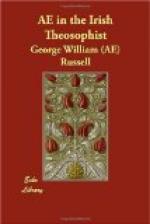“You could speak of love to me, and write and think of it like this!” She placed her hand on the unfortunate magazines. Harvey followed the movement of her arm. He took the papers up, then suddenly saw all as she turned and walked away,—what the passion of these poems must have seemed to her. What had he been in her presence that could teach her otherwise? Only a doubter and questioner. In a dreadful moment his past rose up before him, dreamy, weak, sensual. His conscience smote him through and through. He could find no word to say. Self-condemned, he moved blindly to the gate and went out. He hardly knew what he was doing. Before him the pale dry road wound its way into the twilight amid the hedges and cottages. Phantasmal children came and went. There seemed some madness in all they were doing. Why did he not hear their voices? They ran round and round; there should have been cries or laughter or some such thing. Then suddenly something seemed to push him forward, and he went on blankly and walked down the lane. In that tragic moment his soul seemed to have deserted him, leaving only a half-animal consciousness. With dull attention he wondered at the muffled sound of his feet upon the dusty road, and the little puffs of smoke that shot out before them. Every now and then something would throb fiercely for an instant and be subdued. He went on and on. His path lay across some fields. He stopped by force of habit and turned aside from the road. Again the same fierce throb. In a wild instant he struggled for recollection and self-mastery, and then the smothered soul rushed out of the clouds that oppressed it. Memories of hope and shame: the morning gladness of his heart: the brilliant and spiritual imaginations that inspired him: their sudden ending: the degradation and drudgery of the life he was to return to on the morrow: all rose up in tumultuous conflict. A feeling of anguish that was elemental and not of the moment filled him. Drifting and vacillating nature—he saw himself as in a boat borne along by currents that carried him, now near isles of beauty, and then whirled him away from their vanishing glory into gloomy gulfs and cataracts that went down into blackness. He was master neither of joy nor sorrow. Without will: unpractical; with sensitiveness which made joy a delirium and gloom a very hell; the days he went forward to stretched out iron hands to bind him to the deadly dull and commonplace. These vistas, intolerable and hopeless, overcame him. He threw himself down in his despair. Around his head pressed the cool grasses wet with dew. Strange and narrow, the boundary between heaven and hell! All around him primeval life innocent and unconscious was at play. All around him, stricken with the fever of life, that Power which made both light and darkness, inscrutable in its workings, was singing silently the lovely carol of the flowers.




